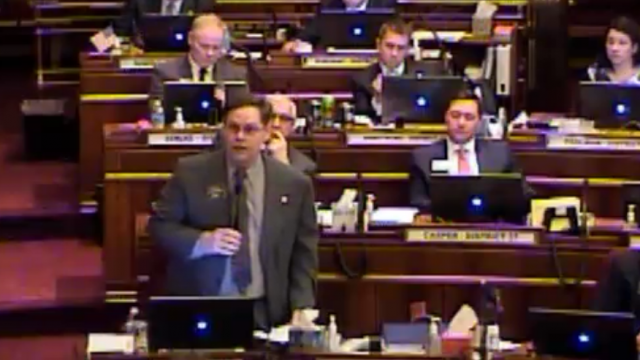Video: Senators Defeat Bill For Annual Sessions

The bill had bi-partisan support, mostly from Republicans who represent districts in western North Dakota or from lawmakers who farm and don’t like the current session pushing so deep into the spring planting season. Ultimately, there wasn’t enough support to pass the Senate chamber.
[mks_pullquote align=”right” width=”300″ size=”24″ bg_color=”#000000″ txt_color=”#ffffff”]”The state constitution only requires that the Legislature meet for no more than 80 days every session, and that they convene for the first time no later than early January. Beyond that, statute allows for the Legislature to re-convene on its own if it has legislative days remaining. Meaning lawmakers could decide among themselves to do exactly what this bill would mandate. They don’t.”[/mks_pullquote]
One argument put forward by the bills proponents was that the legislature’s work could be split up. Budget-related bills could be heard in one session, while policy-related bills could be heard in another, but Senator Judy Lee (R-Fargo) didn’t see that as workable.
“The idea that we separate money from policy bills…maybe I’m a slow learner but I’m nto understanding that,” she said going on to point out that nearly every policy bill has an impact on the state’s appropriations.
Senator Brad Bekkedahl (R-Fargo) argued that the state’s budgets have ballooned to the point where annual sessions may be necessary to keep track of it all. “We’re now into a $14-15 billion budget,” he said. “Just a few years ago we were at a $3-4 billion budget.”
But Senator Dick Dever (R-Bismarck) pointed out that the Legislature doesn’t need this bill to meet annually. “If we could exercise the discipline needed to implement this bill we wouldn’t need it,” he said. He has a point. The state constitution only requires that the Legislature meet for no more than 80 days every session, and that they convene for the first time no later than early January. Beyond that, statute allows for the Legislature to re-convene on its own if it has legislative days remaining.
Meaning lawmakers could decide among themselves to do exactly what this bill would mandate. They don’t.
The rest of the debate circled around the impact the timing of the session has on who can server. “Maybe we work on weekends. We need to do something to compress our business,” said Senator Joe Miller (R-Park River), who notes that session going late into spring makes his job as a farmer tough. “Unless you’re retired, this becomes a very difficult job for anyone to do.”
But Senator Kelly Armstrong (R-Dickinson) gave the counterpoint to that argument, pointing out that annual sessions would be difficult for people in other professions.
Ultimately, the bill failed on a 19-28 vote, which isn’t surprising. The Legislature has been debating this issue for a long time now, and it never really gets a lot of traction. There is another bill, HB1342, which hasn’t received a vote in the House yet. It would spilt the 80 day session up into a 60 day session in even years, and a 20 day session in odd years.
I don’t think that bill has much of a shot either.




